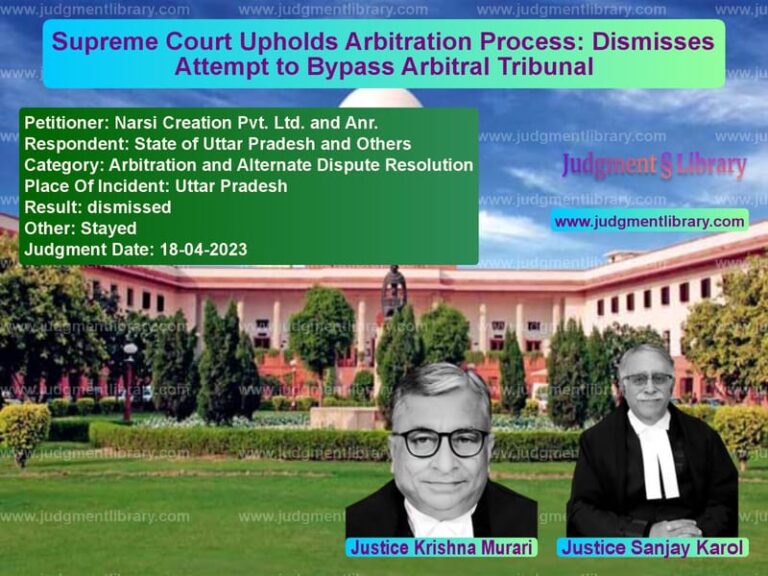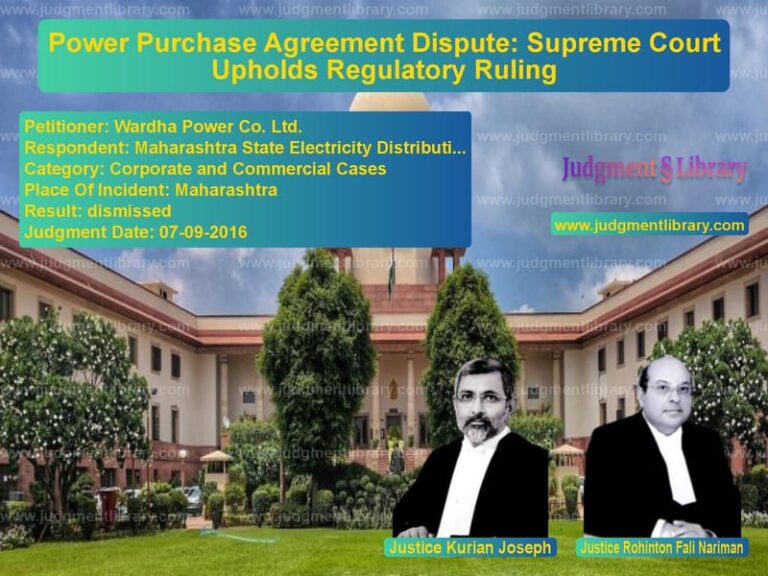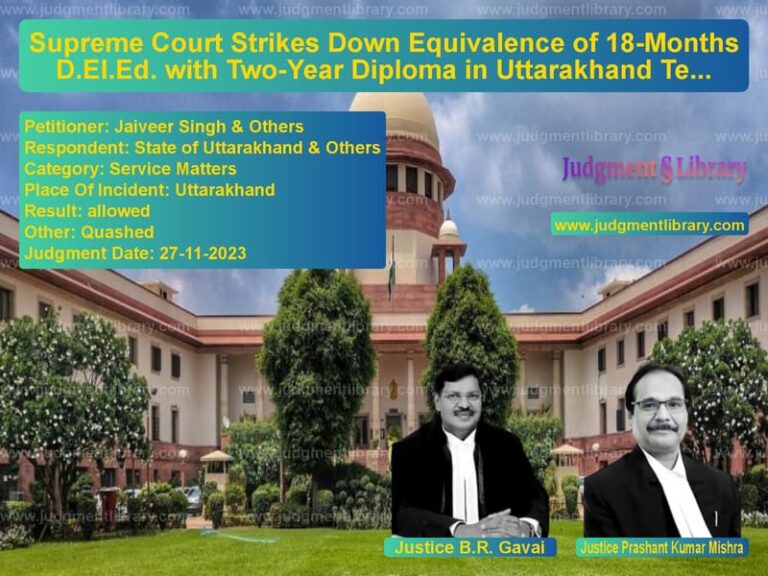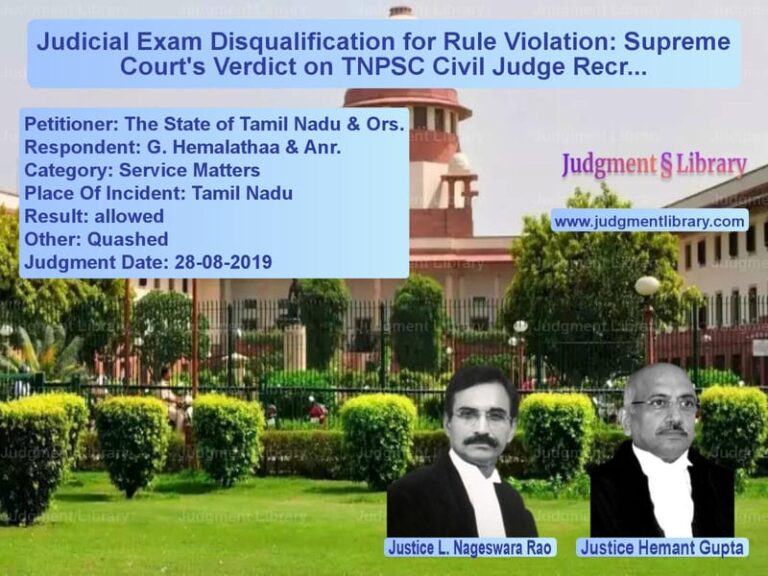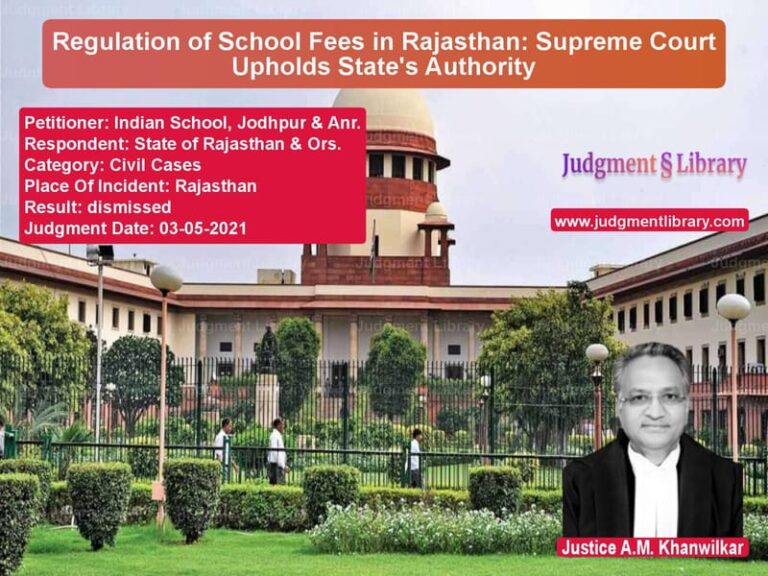Supreme Court Revokes Probate in Landmark Property Dispute Case
The Supreme Court in Manju Puri vs. Rajiv Singh Hanspal & Others ruled on a significant property dispute involving the revocation of a probate granted in 1982 concerning the Will of Surjan Singh Randhawa. The case revolves around allegations of forgery, lack of proper notification to legal heirs, and improper execution of the probate proceedings. The Court’s decision underscores the importance of due process in testamentary matters, ensuring that legitimate heirs are not deprived of their rightful inheritance.
Background of the Case
The dispute arose over an immovable property situated at 5/1C Belvedere Road, Kolkata, which was originally owned by Surjan Singh Randhawa and his brother. Randhawa’s Will, dated June 15, 1961, bequeathed the property to his eldest daughter, Gian Hanspal. Following his death on November 28, 1962, a probate petition was filed by his brother, Bachittar Singh Randhawa, in 1982. The petition included ‘no objection’ certificates from Surjan’s wife, Harnam Kaur Randhawa, and both daughters, Gian Hanspal and Beena Kumari Mehra.
In 2011, the appellant, Manju Puri, the daughter of Beena Kumari Mehra, filed for revocation of the probate, alleging that her mother’s signature on the no-objection certificate was forged and that she was unaware of the probate proceedings.
Petitioner’s Arguments
Manju Puri, represented by senior advocate Siddharth Luthra, raised the following arguments:
- The probate granted in 1982 was obtained fraudulently, as no proper citation was issued to all legal heirs.
- The signature of her mother, Beena Kumari Mehra, on the no-objection certificate was forged. She always signed as ‘Beena Kumari Mehra,’ whereas the document contained ‘Beena Mehra.’
- The probate application was filed in May 1982 and granted within a week, on June 4, 1982, without due diligence by the court.
- Her mother filed a partition suit in 1984 seeking a share in the property, proving she was unaware of the probate.
- She only discovered the probate proceedings in 2011 while inspecting the sale deed of the property, prompting her to file for revocation.
Respondents’ Arguments
Rajiv Singh Hanspal, the legal heir of Gian Hanspal, opposed the revocation petition through senior advocate Jayant Bhushan, presenting the following arguments:
- There was no requirement for a citation under the Indian Succession Act if the legal heirs had consented.
- There was no challenge to the probate for over 30 years, implying acquiescence by the legal heirs.
- The partition suit filed by Beena Kumari Mehra was dismissed for non-prosecution, further weakening the petitioner’s case.
- The property had already been sold in 2010 to a bona fide third-party purchaser, Rungta Mines Ltd., and revoking the probate now would create legal uncertainty.
Supreme Court’s Judgment
The Supreme Court, in its detailed ruling, revoked the probate granted in 1982, emphasizing procedural lapses and potential fraud. The key observations included:
1. Lack of Proper Citation
- The Court held that in probate matters, all legal heirs must be notified unless they explicitly waive their rights.
- It ruled:
“The failure to issue a citation to all legal heirs amounts to a violation of due process and vitiates the entire probate proceedings.”
2. Fraudulent Representation
- The Court found merit in the petitioner’s claim that her mother’s signature was forged.
- The judgment stated:
“A probate obtained through false representations cannot be allowed to stand.”
3. Delay in Challenging the Probate
- Although the challenge was filed 30 years after the probate was granted, the Court ruled that delay does not legitimize fraud.
- The Court observed:
“Fraud vitiates all judicial proceedings, and delay cannot be a ground to refuse revocation if fraud is established.”
4. Bona Fide Purchaser’s Rights
- The Court acknowledged the concerns of Rungta Mines Ltd., the current owner of the property, but clarified that the revocation of probate does not automatically nullify their ownership.
- The Court directed the parties to resolve ownership disputes through separate civil litigation.
5. Revival of Probate Proceedings
- The Supreme Court directed the Calcutta High Court to reconsider the original probate application afresh, ensuring due notice is issued to all legal heirs.
Impact of the Judgment
This ruling has far-reaching implications for inheritance law and probate procedures:
- Reaffirms the Requirement for Proper Notification: Legal heirs must be given an opportunity to contest probate applications.
- Strengthens Protections Against Fraud: Establishes that fraud can nullify even decades-old judicial orders.
- Clarifies the Rights of Bona Fide Purchasers: While probate revocation affects succession claims, third-party ownership must be resolved separately.
Conclusion
The Supreme Court’s decision in Manju Puri vs. Rajiv Singh Hanspal & Others reinforces the importance of following due process in probate proceedings. By revoking the 1982 probate due to lack of citation and allegations of forgery, the Court has upheld the fundamental principles of justice. This case serves as a crucial precedent in property and inheritance disputes, ensuring that legal heirs are not deprived of their rightful claims due to procedural irregularities or fraudulent actions.
Petitioner Name: Manju Puri.Respondent Name: Rajiv Singh Hanspal & Others.Judgment By: Justice Ashok Bhushan, Justice Navin Sinha.Place Of Incident: Kolkata, West Bengal.Judgment Date: 14-11-2019.
Don’t miss out on the full details! Download the complete judgment in PDF format below and gain valuable insights instantly!
Download Judgment: Manju Puri vs Rajiv Singh Hanspal Supreme Court of India Judgment Dated 14-11-2019.pdf
Direct Downlaod Judgment: Direct downlaod this Judgment
See all petitions in Property Disputes
See all petitions in Succession and Wills
See all petitions in Landlord-Tenant Disputes
See all petitions in Damages and Compensation
See all petitions in Judgment by Ashok Bhushan
See all petitions in Judgment by Navin Sinha
See all petitions in allowed
See all petitions in Quashed
See all petitions in supreme court of India judgments November 2019
See all petitions in 2019 judgments
See all posts in Civil Cases Category
See all allowed petitions in Civil Cases Category
See all Dismissed petitions in Civil Cases Category
See all partially allowed petitions in Civil Cases Category


